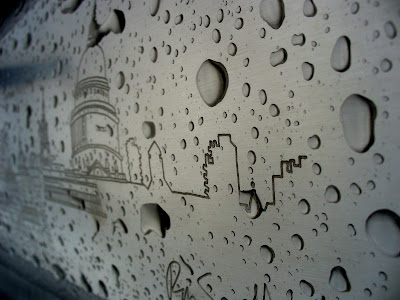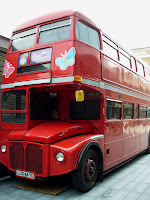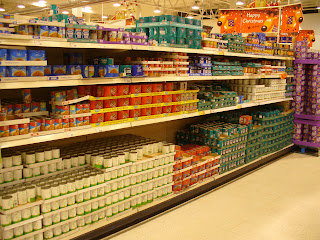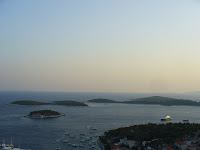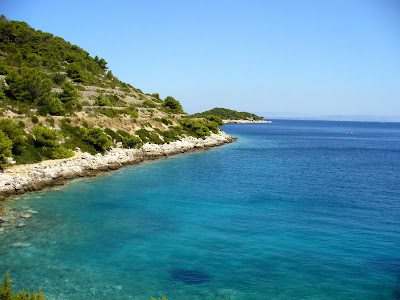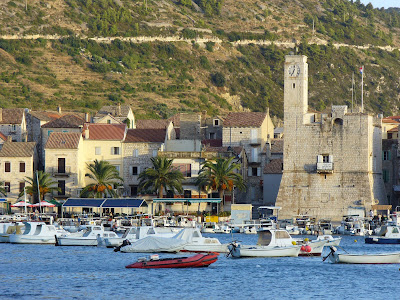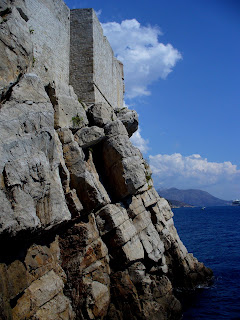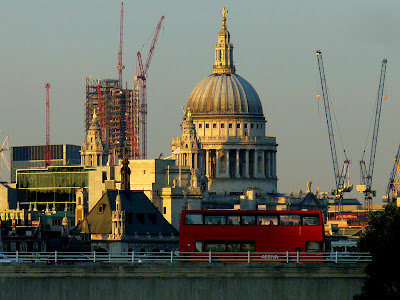 I had the privilege to spend this past Christmas in Ireland. This beautiful island is quickly becoming my second home in Europe (four visits in 14 months). My stay this time was concentrated in County Cork (West Cork to be specific). The coastal scenery is breathtaking, with the wild sea surging against tall cliffs and the lashing wind and rain creating an emerald static that blurs the backdrop of rocky hills. I was very lucky to get the local tour from my friend Una. Her family kindly welcomed me into their home and showed me a very good time.
I had the privilege to spend this past Christmas in Ireland. This beautiful island is quickly becoming my second home in Europe (four visits in 14 months). My stay this time was concentrated in County Cork (West Cork to be specific). The coastal scenery is breathtaking, with the wild sea surging against tall cliffs and the lashing wind and rain creating an emerald static that blurs the backdrop of rocky hills. I was very lucky to get the local tour from my friend Una. Her family kindly welcomed me into their home and showed me a very good time.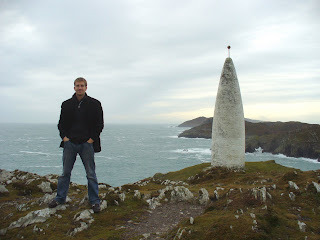 Laughter was never in short supply on this holiday. I was usually the cause or the source of the ridicule. A word of caution: when visiting Ireland it is important to have very, very thick skin. Check all arrogance, pomp, elitism and naivete at the door, because the Irish do not let up on you. Much like how a dog can smell fear, these islanders detect snobbery with just one simple glance. The Irish as a whole are low-key and don't take themselves very seriously (a cultural opposite reaction to England I think). I find this enchanting and it makes everyone who visits the country feel truly welcomed and a majority of the locals approachable. They really do want to know your story, unlike the British who generally smile and then scamper off to wait in line somewhere.
Laughter was never in short supply on this holiday. I was usually the cause or the source of the ridicule. A word of caution: when visiting Ireland it is important to have very, very thick skin. Check all arrogance, pomp, elitism and naivete at the door, because the Irish do not let up on you. Much like how a dog can smell fear, these islanders detect snobbery with just one simple glance. The Irish as a whole are low-key and don't take themselves very seriously (a cultural opposite reaction to England I think). I find this enchanting and it makes everyone who visits the country feel truly welcomed and a majority of the locals approachable. They really do want to know your story, unlike the British who generally smile and then scamper off to wait in line somewhere.
The West Cork accent took a bit of getting used to. Had subtitles or even closed captioning appeared beneath the speaker's chin, I would have dropped a knee and sworn allegiance to the Pope right then and there. The Irish accent that you expect to hear (think Lucky Charm's cereal commercial) is cruelly replaced by a rapid-fire delivery with no pauses and no punctuation (picture Brad Pit's character in the film "Snatch"). At my best, I could discern a question being asked of me by interpreting inflection, tone and the fear of a realization that they are talking at me and nobody else is in the vicinity. At worst, I miss the entire sentence and just stare at them dumbfounded (hence the large amount of laughter directed at me). It got better as the days went on. I learned to laugh with them so as to make them think I knew what they said about me.
 It seems you can't be a true visitor to West Cork until you get a nickname. Everyone seems to have one, be it, "The Boss" to "Pig Fingers" or "Jimmy-where's-my-wallet." My nickname was soon forged and I was dubbed, "The Divorce Force." I am not sure if dramatic irony goes up a few notches since this is a predominantly Catholic country or if the politically incorrect meter just self-destructed. Like I said, come over with thick skin and you will be rewarded with laughter and a new sense of self awareness you thought never existed.
It seems you can't be a true visitor to West Cork until you get a nickname. Everyone seems to have one, be it, "The Boss" to "Pig Fingers" or "Jimmy-where's-my-wallet." My nickname was soon forged and I was dubbed, "The Divorce Force." I am not sure if dramatic irony goes up a few notches since this is a predominantly Catholic country or if the politically incorrect meter just self-destructed. Like I said, come over with thick skin and you will be rewarded with laughter and a new sense of self awareness you thought never existed. On the second night we visited my hosts cousin's (Mary Botty) pub called L'il McArthy's. Irish Pub's generally have the following characteristics: Coal fire, old black and white photos of local sports team (pre-John McCain kind of old), a clock that is frozen on 10:30 and antique trinkets and jugs hanging on the wall/ceiling. Una (Spoons) and Claire [sister](Nana) and John [father](the Boss) and Teresa [sister] (The Big One) have a gem of a local pub. Located in Castletownsend, it is tucked away on a stone lined city street that arcs downhill towards the ocean. It was great to see several generations of Irishmen and women sharing a laugh and enjoying a pint. It is here where the culture, stories, music and gossip are exchanged freely. This is where the 'craic' is created.
On the second night we visited my hosts cousin's (Mary Botty) pub called L'il McArthy's. Irish Pub's generally have the following characteristics: Coal fire, old black and white photos of local sports team (pre-John McCain kind of old), a clock that is frozen on 10:30 and antique trinkets and jugs hanging on the wall/ceiling. Una (Spoons) and Claire [sister](Nana) and John [father](the Boss) and Teresa [sister] (The Big One) have a gem of a local pub. Located in Castletownsend, it is tucked away on a stone lined city street that arcs downhill towards the ocean. It was great to see several generations of Irishmen and women sharing a laugh and enjoying a pint. It is here where the culture, stories, music and gossip are exchanged freely. This is where the 'craic' is created. The Irish were the first in the European Union to ban smoking back in 2004. This was a welcome change for a vast majority of the 4.2 million residents of Ireland. I was lucky enough to bare witness to an objector when the owner of the joint (Mary Botty) came over with a fag [cigarette] in her mouth and delivered another round. She warned us with the glowing ember bouncing up and down between her lips, "Gards ar outside! Gards ar outside! Yeeneedanother?" Ireland may also have been the first (and only) nation to disallow drinking in pubs after midnight. This legislation defies all cultural logic and equates to banning all AK-47s in Iraq. No one seemed particularly worried on this night and we stayed put well into the morning. I heard stories of the entire establishment rushing out the back door and resuming festivities in the neighbor's adjacent yard or a field down the way. It appears this law is not regularly enforced. The "Gards" or Garda (the official national police of Ireland) have bigger responsibilities. Their main concern is cracking down on drunk driving. One recent statistic I gleaned from the local paper was that 1 in 5 fatal crashes on Ireland's dangerously narrow and twisty roads occurs between 6am and noon. Many of these are alcohol related. Too many try to arrive at work drunk and on time than late and hungover. The Gardas presence outside Mary Botty's that night was just a little cat-and-mouse game to let the people know they are around and nobody should drive home drunk. Lucky for us that night, Mrs. O'Donovan [Mother] (Biddy) picked us up.
The Irish were the first in the European Union to ban smoking back in 2004. This was a welcome change for a vast majority of the 4.2 million residents of Ireland. I was lucky enough to bare witness to an objector when the owner of the joint (Mary Botty) came over with a fag [cigarette] in her mouth and delivered another round. She warned us with the glowing ember bouncing up and down between her lips, "Gards ar outside! Gards ar outside! Yeeneedanother?" Ireland may also have been the first (and only) nation to disallow drinking in pubs after midnight. This legislation defies all cultural logic and equates to banning all AK-47s in Iraq. No one seemed particularly worried on this night and we stayed put well into the morning. I heard stories of the entire establishment rushing out the back door and resuming festivities in the neighbor's adjacent yard or a field down the way. It appears this law is not regularly enforced. The "Gards" or Garda (the official national police of Ireland) have bigger responsibilities. Their main concern is cracking down on drunk driving. One recent statistic I gleaned from the local paper was that 1 in 5 fatal crashes on Ireland's dangerously narrow and twisty roads occurs between 6am and noon. Many of these are alcohol related. Too many try to arrive at work drunk and on time than late and hungover. The Gardas presence outside Mary Botty's that night was just a little cat-and-mouse game to let the people know they are around and nobody should drive home drunk. Lucky for us that night, Mrs. O'Donovan [Mother] (Biddy) picked us up. The time flew by with daily driving excursions, or "spins" through quaint local towns like Baltimore which boasted numerous pubs a few cafes and excellent pizza. Una introduced me to the world's best crab sandwiches at O'sullivans in Crookhaven that overlooked a stormy bay inlet. Homemade scones down the way at Hayes in a coastal village called Glandore were divine--especially with the fresh cream. Linking these coastal villages are rolling hills, lush glens, farms, moss-covered castle ruins and sheep. For the most part, the area looks frozen in time being still predominantly agricultural and rural. Yet Ireland has seen some drastic change recently in its otherwise long and often bleak history.
The time flew by with daily driving excursions, or "spins" through quaint local towns like Baltimore which boasted numerous pubs a few cafes and excellent pizza. Una introduced me to the world's best crab sandwiches at O'sullivans in Crookhaven that overlooked a stormy bay inlet. Homemade scones down the way at Hayes in a coastal village called Glandore were divine--especially with the fresh cream. Linking these coastal villages are rolling hills, lush glens, farms, moss-covered castle ruins and sheep. For the most part, the area looks frozen in time being still predominantly agricultural and rural. Yet Ireland has seen some drastic change recently in its otherwise long and often bleak history.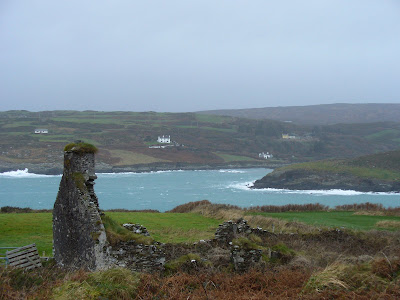 The Romans never quite made it across the Irish sea from England and as a result, the Vikings and Celts carved out this land. Most of the major cities in Ireland originated along the coastline, with inland rivers providing a safe harbor to help facilitate trade with mainland Europe. Monastic orders were founded in the 5th and 6th centuries and soon Catholicism flourished. England maintained a heavy and often brutal hand on this island. Tensions ran particularly high during the 17th century which saw Oliver Cromwell ruthlessly crush a Catholic resistance to English rule in 1649. Enough men women and children were senselessly slaughtered as to ensure that the name Oliver would remain about as popular in Ireland as Adolph is in Israel.
The Romans never quite made it across the Irish sea from England and as a result, the Vikings and Celts carved out this land. Most of the major cities in Ireland originated along the coastline, with inland rivers providing a safe harbor to help facilitate trade with mainland Europe. Monastic orders were founded in the 5th and 6th centuries and soon Catholicism flourished. England maintained a heavy and often brutal hand on this island. Tensions ran particularly high during the 17th century which saw Oliver Cromwell ruthlessly crush a Catholic resistance to English rule in 1649. Enough men women and children were senselessly slaughtered as to ensure that the name Oliver would remain about as popular in Ireland as Adolph is in Israel.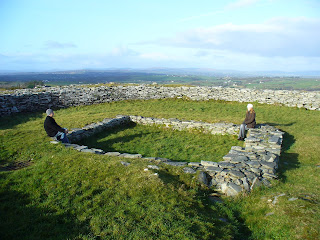 The potato famine (1845-1851) decimated the population and acted as a catalyst for a massive wave of Irish immigration to the East Coast of the United States and elsewhere. In 1807, Ireland was the most densely populated country in Europe, by the 1860's it was one of the least. Out of a estimated population of 8 million, the famine took the lives of well over one million people, and facilitated the departure of another million. In six years, the country lost a quarter of its people. Western Ireland suffered particularly acute misfortune during the famine and there are numerous mass grave sites commemorating the dead. England's efforts to tackle the famine can, at best be described as lackluster and more accurately explained as criminal. Throughout the entire 6 years of the famine the British government never provided massive food aid because the English landowners and businesses would have been harmed by fluctuating food prices. As a result, starved masses watched boatloads of Irish-grown oats and grain depart for English shores. During the height of the famine, the British Parliament passed a budget for £200,000 for the "beautification of Battersea Park" in London, that same year they allocated £100,000 to combat the famine. The cause of the famine turned out to be a nasty airborne fungus that invaded the island from open cargo holds on ships returning from North America. The spores destroyed the plants and spread like wildfire. It thrived on the cool, wet conditions that were previously so favorable for growing potatoes (a vegetable that originated in the Andes of South America and were introduced by returning Spanish conquistadors in the 16th Century).
The potato famine (1845-1851) decimated the population and acted as a catalyst for a massive wave of Irish immigration to the East Coast of the United States and elsewhere. In 1807, Ireland was the most densely populated country in Europe, by the 1860's it was one of the least. Out of a estimated population of 8 million, the famine took the lives of well over one million people, and facilitated the departure of another million. In six years, the country lost a quarter of its people. Western Ireland suffered particularly acute misfortune during the famine and there are numerous mass grave sites commemorating the dead. England's efforts to tackle the famine can, at best be described as lackluster and more accurately explained as criminal. Throughout the entire 6 years of the famine the British government never provided massive food aid because the English landowners and businesses would have been harmed by fluctuating food prices. As a result, starved masses watched boatloads of Irish-grown oats and grain depart for English shores. During the height of the famine, the British Parliament passed a budget for £200,000 for the "beautification of Battersea Park" in London, that same year they allocated £100,000 to combat the famine. The cause of the famine turned out to be a nasty airborne fungus that invaded the island from open cargo holds on ships returning from North America. The spores destroyed the plants and spread like wildfire. It thrived on the cool, wet conditions that were previously so favorable for growing potatoes (a vegetable that originated in the Andes of South America and were introduced by returning Spanish conquistadors in the 16th Century). Irish independence gained strength and popularity at the turn of the 20th Century and in 1916 the "Easter Uprising" in Dublin marked the steady increase of resistance. Michael Collins (County Cork born) helped lead the independence movement that eventually gained traction and became what is now known as the IRA. The British responded with a brutal paramilitary force known as the Black and Tans (This is the reason why you NEVER order a Black and Tan at an Irish Pub anywhere in the World!) and proceeded to terrorize the local population. Their tactics were brutal and soon united the entire nation against the British occupation. By 1921, Collins managed to secure a controversial deal with England that gave Ireland 'dominion status'--basically they were allowed to govern themselves (except 6 northern counties who opted out) but still remain part of the United Kingdom. This fueled an internal civil war that cleaved the IRA into 'regulars' and 'irregulars'. This bloody internal feud tore the country apart and pitted brother against brother. Ireland gained full independence from England in 1937, and was finally recognized as a sovereign state.
Irish independence gained strength and popularity at the turn of the 20th Century and in 1916 the "Easter Uprising" in Dublin marked the steady increase of resistance. Michael Collins (County Cork born) helped lead the independence movement that eventually gained traction and became what is now known as the IRA. The British responded with a brutal paramilitary force known as the Black and Tans (This is the reason why you NEVER order a Black and Tan at an Irish Pub anywhere in the World!) and proceeded to terrorize the local population. Their tactics were brutal and soon united the entire nation against the British occupation. By 1921, Collins managed to secure a controversial deal with England that gave Ireland 'dominion status'--basically they were allowed to govern themselves (except 6 northern counties who opted out) but still remain part of the United Kingdom. This fueled an internal civil war that cleaved the IRA into 'regulars' and 'irregulars'. This bloody internal feud tore the country apart and pitted brother against brother. Ireland gained full independence from England in 1937, and was finally recognized as a sovereign state. A reversal of trends began when Ireland joined the European Union. This began to transform Ireland from a strictly rural and agricultural state to one of a more modern and technologically advanced nation. This growth reached its zenith in the late 1990's when the dot com bubble touched Dublin which earned the "Celtic Tiger" moniker. EU subsidies flooded into the country and suddenly farmers were handsomely rewarded for their products. Roads to nowhere were laid down and monuments to inane objects were built. It was as if the entire country was suddenly handed a winning lotto ticket. In a way, the Irish were a bit ashamed of all the new wealth. They had never been used to this kind of economic boom and the entire culture had to adjust to it without losing their salt-of-the-earth identity. I like to think they have pulled it off spectacularly. Practically the entire culture embraces the "pay it forward" mentality. They are still humble, kind and sharing people. Having recently finished reading a book about an Englishman who successfully hitch hiked around Ireland with a mini-fridge, I'm convinced. The man not only made it, but turned into a celebrity with drivers going out of their way to give him a lift because they heard him on the radio.
A reversal of trends began when Ireland joined the European Union. This began to transform Ireland from a strictly rural and agricultural state to one of a more modern and technologically advanced nation. This growth reached its zenith in the late 1990's when the dot com bubble touched Dublin which earned the "Celtic Tiger" moniker. EU subsidies flooded into the country and suddenly farmers were handsomely rewarded for their products. Roads to nowhere were laid down and monuments to inane objects were built. It was as if the entire country was suddenly handed a winning lotto ticket. In a way, the Irish were a bit ashamed of all the new wealth. They had never been used to this kind of economic boom and the entire culture had to adjust to it without losing their salt-of-the-earth identity. I like to think they have pulled it off spectacularly. Practically the entire culture embraces the "pay it forward" mentality. They are still humble, kind and sharing people. Having recently finished reading a book about an Englishman who successfully hitch hiked around Ireland with a mini-fridge, I'm convinced. The man not only made it, but turned into a celebrity with drivers going out of their way to give him a lift because they heard him on the radio. The language (of what I could pick up) is entertaining. The most unique saying the Irish have is 'craic'. This is originally a Gaelic word that can loosely be translated as 'fun'. It is most often used in the company of friends, the drink, music and casual romance. Its a very organic expression and one that, "...pertains to an atmosphere of comfortable and pervasive conviviality, a complete absence of distrust in pleasant, relaxed and relaxing company." Or something like that.
The language (of what I could pick up) is entertaining. The most unique saying the Irish have is 'craic'. This is originally a Gaelic word that can loosely be translated as 'fun'. It is most often used in the company of friends, the drink, music and casual romance. Its a very organic expression and one that, "...pertains to an atmosphere of comfortable and pervasive conviviality, a complete absence of distrust in pleasant, relaxed and relaxing company." Or something like that.Another word that often accompanies 'craic' is 'like'. Fortunately, its not used with the same teenage-valley-girl-vigor as we are used to in the States. It is used to fill an expression or put a bit of window dressing on it. For example, "Oh, last night was good craic- like."
Ireland had a dilemma being so strongly Catholic, yet honest and expressive. They bridged this gap with the word, 'feck'. By swapping vowels, they disarmed the big bad 'f' word into an expression your grandmother would use (were she Irish and mildly upset). Its fun for the whole feckin' family!
The Irish favorite has to be, 'Yer man'. This is used to denote a passing ownership through slight association. Such as your local pharmacist. Instead of, "Carl down at Rite Aid closed up early so my prescription for Prozac can't get filled." It goes, "Yer Man at the chemist's fecked-off to the pub and now I'm left with no Prozac. Yee want another pint?"
Which leads to the informal plural, "Yee". It is Ireland's version of the American Southeastern term, "Y'all."
My absolute favorite is "give you a bell". This basically says I will call you later, or you can tell someone to ring you. Good craic.
 Suffice to say, I was so reluctant to leave Ireland that I secured a lift one day early. My scheduling blunder was revealed to me while in the security line at Cork International Airport, "Everything alright" I ask the security man at the metal detector. "Oh everything looks grand . . .except that you fly out tomorrow. " This is when he points out the date written in large font on my ticket and sort of looks at me with pity and humor. Most readers of this Blog will agree this is TOTALLY out of character for me to do any such thing. After fighting back the embarrassment of the situation, I enacted my brilliant plan, "Operation Dignity Salvage" with great aplomb. Ryanair quickly torpedoed my plan with their astronomical ticket options and penalties. Mission not accomplished. I was forced to make a very uncomfortable phone call to Claire (Nana) right after she drove an hour to drop me at the airport and was looking forward to relaxing at her house in Cork. The conversation went something like this:
Suffice to say, I was so reluctant to leave Ireland that I secured a lift one day early. My scheduling blunder was revealed to me while in the security line at Cork International Airport, "Everything alright" I ask the security man at the metal detector. "Oh everything looks grand . . .except that you fly out tomorrow. " This is when he points out the date written in large font on my ticket and sort of looks at me with pity and humor. Most readers of this Blog will agree this is TOTALLY out of character for me to do any such thing. After fighting back the embarrassment of the situation, I enacted my brilliant plan, "Operation Dignity Salvage" with great aplomb. Ryanair quickly torpedoed my plan with their astronomical ticket options and penalties. Mission not accomplished. I was forced to make a very uncomfortable phone call to Claire (Nana) right after she drove an hour to drop me at the airport and was looking forward to relaxing at her house in Cork. The conversation went something like this:Jon: "Hi Claire. It turns out I am a bit early for my flight"
Claire (Nana): "Was it was delayed or someting? How much time do you have?"
Jon: " . . .erm, just over 25 hours or so"
Claire (Nana): "[laughter]. . . ."
Jon: "How much would it cost me to pay you NOT to tell anyone about this little scheduling snafu?"
Claire (Nana): "There is no amount of money that can keep me quiet about this. . .[under her breath] feckin' Americans"
And so, once more I got to drive on the beautiful country lanes back to West Cork and Claire (Nana) got to enjoy one more delicious home-cooked meal. Even on my last day [second to last], Ireland helped remind me that humility is a good thing and if you can't make fun of yourself, you are never going to enjoy the craic. On the plus side, my next visit to the Ireland will no doubt yield me another nickname (provided I get the dates correct).
